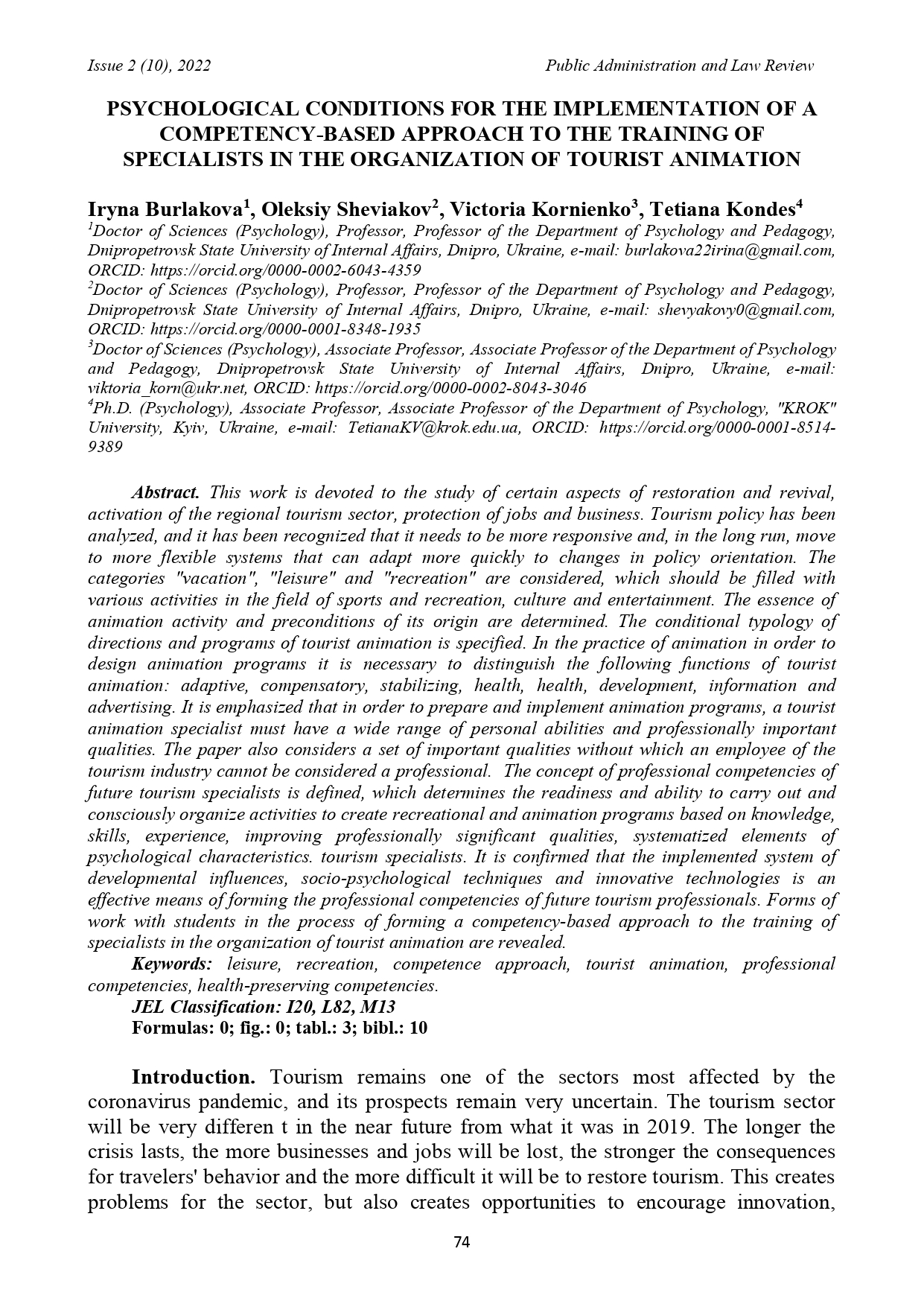PSYCHOLOGICAL CONDITIONS FOR THE IMPLEMENTATION OF A COMPETENCY-BASED APPROACH TO THE TRAINING OF SPECIALISTS IN THE ORGANIZATION OF TOURIST ANIMATION
DOI:
https://doi.org/10.36690/2674-5216-2022-2-74Keywords:
leisure, recreation, competence approach, tourist animation, professional competencies, health-preserving competenciesAbstract
This work is devoted to the study of certain aspects of restoration and revival, activation of the regional tourism sector, protection of jobs and business. Tourism policy has been analyzed, and it has been recognized that it needs to be more responsive and, in the long run, move to more flexible systems that can adapt more quickly to changes in policy orientation. The categories "vacation", "leisure" and "recreation" are considered, which should be filled with various activities in the field of sports and recreation, culture and entertainment. The essence of animation activity and preconditions of its origin are determined. The conditional typology of directions and programs of tourist animation is specified. In the practice of animation in order to design animation programs it is necessary to distinguish the following functions of tourist animation: adaptive, compensatory, stabilizing, health, health, development, information and advertising. It is emphasized that in order to prepare and implement animation programs, a tourist animation specialist must have a wide range of personal abilities and professionally important qualities. The paper also considers a set of important qualities without which an employee of the tourism industry cannot be considered a professional. The concept of professional competencies of future tourism specialists is defined, which determines the readiness and ability to carry out and consciously organize activities to create recreational and animation programs based on knowledge, skills, experience, improving professionally significant qualities, systematized elements of psychological characteristics. tourism specialists. It is confirmed that the implemented system of developmental influences, socio-psychological techniques and innovative technologies is an effective means of forming the professional competencies of future tourism professionals. Forms of work with students in the process of forming a competency-based approach to the training of specialists in the organization of tourist animation are revealed.
Downloads
References
Bulygina I.I., Haranin M.I. (2000). About animation activities in tourist and sports and health facilities. Theory and practice of physical culture. No. 11. pp.31-34.
Zorin I.V., Kvartalnov V.A. (2003). Encyclopedia of tourism Handbook. Moscow: Finance and Statistics, 368 p.
Kilimistiy S.M. (2018). Development of animation as a direction of tourist leisure. Art studies notes, No. 33. pp. 47-56.
Kirillova E.B. (2013). Formation of general cultural and professional competences of future specialists in the field of adaptive physical culture in foreign language lessons. Science and education in the 21st century: a collection of scientific works based on the materials of Mezhdunar. scientific and practical conf. September 30, 2013: at 3 p.m. Part. 3; M-vo arr. and science of the Russian Federation. Tambov: TROO "Business Science-Society". pp. 50-52.
Kondes T.V. The role of animation activity in the formation of professional qualities of students majoring in "Tourism". Scientific and practical materials. conf. "Ukrainian perspectives in world development", November 4. 2016, Kyiv. KROK University, 2016. pp. 466-467.
Petrychenko P.A. (2014). Management of customer emotions and impressions. Bulletin of Socio-Economic Research. 2 (53). pp. 232-238.
Features of implementation of competency-based modular programs Effective professional training: website. URL: http://epo. ucoz.com/index/osobennosti_realizacii_ modulnykh_programm_osnovannykh_na_ competencejakh/0-20 (access date: 24.03.2019)
Chumakov K. (2006). Ethno-ecological tourism in preservation of natural and cultural heritage. New life. No. 5. pp. 15-16.
Halian, A., Halian, I., Burlakova, I. (2020). Emotional Intelligence in the Structure of Adaptation Process of Future Healthcare Professionals. Revista Inclusiones. Vol 7, num 3. pp. 447 – 460.
Duricek, M., & Cynarski, W. (2017). Motivational incentives of all round entertainers and types of psychological processes of participants during animation programs. Journal of Martial Arts Anthropology, 17, pp. 9-14.

Downloads
Published
How to Cite
Issue
Section
License
Copyright (c) 2022 Iryna Burlakova, Oleksiy Sheviakov, Victoria Kornienko, Tetiana Kondes

This work is licensed under a Creative Commons Attribution-NonCommercial-NoDerivatives 4.0 International License.





